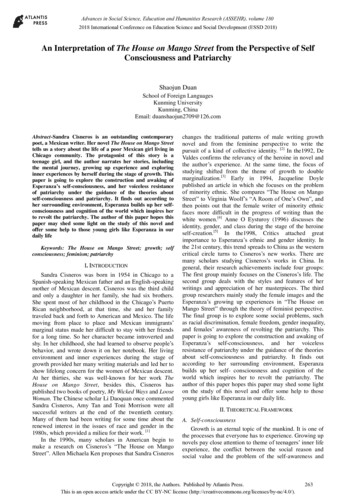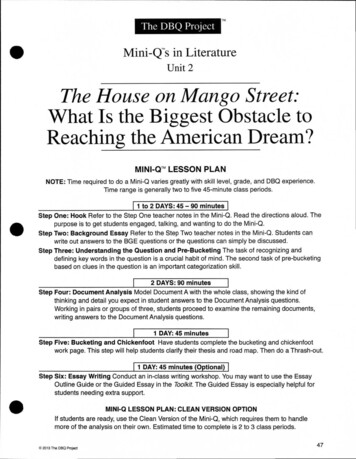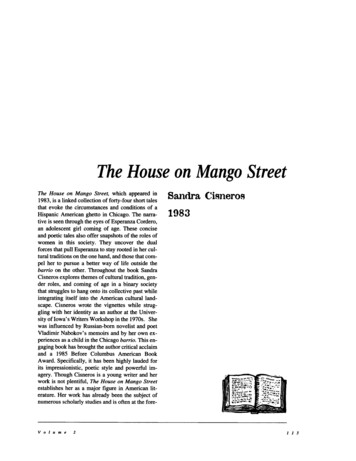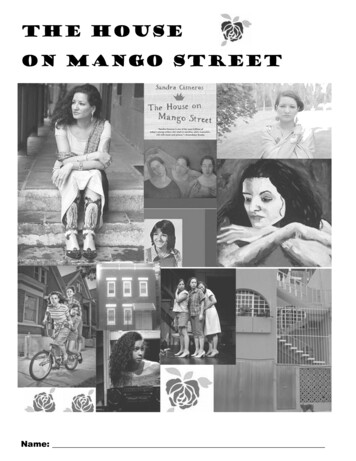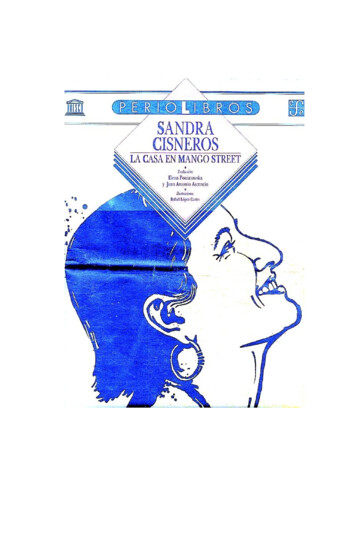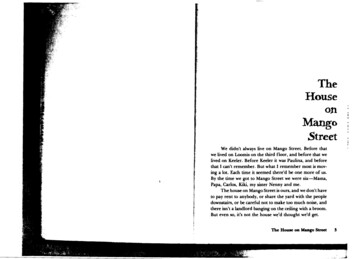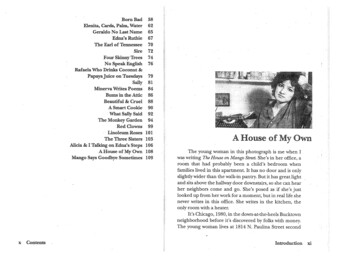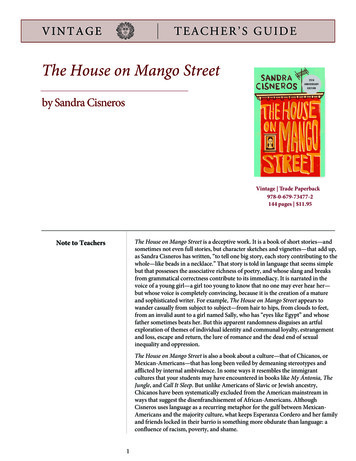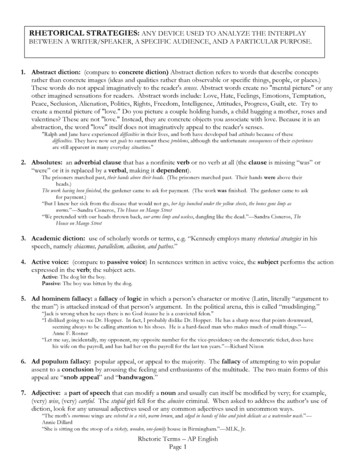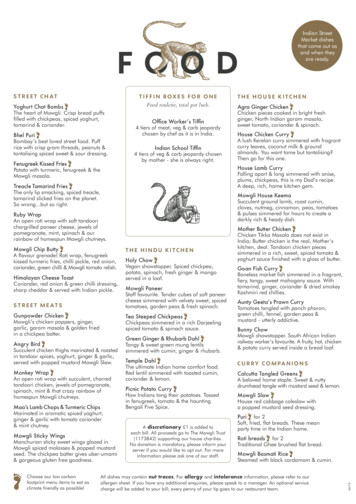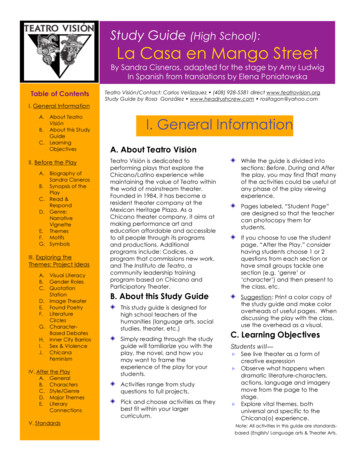
Transcription
Before Readingfrom TheHouse on Mango StreetFiction by Sandra CisnerosWhat STORIES willyou tell your children?RL 1 Cite textual evidence tosupport analysis of what thetext says explicitly as well asinferences drawn from thetext. RL 3 Analyze how complexcharacters develop over thecourse of a text. RL 4 Analyzethe cumulative impact of specificword choices on meaning andtone. L 5a Interpret figures ofspeech in context and analyzetheir role in the text.612Whether it’s a tale about the sweet taste of victory or a description ofa devastating loss, you have important stories to tell. These stories,if you choose to tell them, will someday be the next generation’slegacy—stories, beliefs, and traditions passed on from onegeneration to the next.PRESENT With a classmate, share a few stories you might want totell your kids someday. Then pick your favorite—maybe it’s thefunniest, or the most outrageous, or the one that says the most aboutyou. With a small group, take turns telling your chosen tales. Explainwhy these are the stories you would pass on to the next generation.
Meet the Authortext analysis: author’s perspectiveJust as your own experiences influence the way you thinkabout different issues, a writer’s personal experiences affectthe way he or she approaches a topic. When you analyze anauthor’s perspective, or point of view, you work to figure outhow the writer looks at his or her subject. As you read thisexcerpt from The House on Mango Street, think about SandraCisneros’s perspective on the narrator’s circumstances. Pay attention to the writer’s choice of details. In thesevignettes, Cisneros describes a rundown house in vivid detail.What do her descriptions of its small windows, crumblingbricks, and tiny yard help emphasize? Consider direct statements of the narrator’s thoughts orfeelings. What kind of person is she?As you read, consider what these details and statements revealabout Cisneros’s ideas, as well as her feelings about what it’slike to grow up in a place like the house on Mango Street.Review: Tonereading skill: make inferences about characterWriters don’t usually spell out every single thing theircharacters are thinking and feeling. They often leave it upto the reader to make inferences about what isn’t directlystated. As you read the following vignettes, keep track ofsignificant details that tell you something about the narrator’sbackground, personality, and feelings. Then record theinferences you can draw from these details.Details from the TextMy InferencesEsperanza’s family has movedaround a lot, and she doesn’t soundvery happy about that. (lines 1–3)Esperanza probably wishes herfamily could just stay in one placeand not move around so much.When the family moves to MangoStreet, they finally get their ownhouse. But Esperanza says that“it’s not the house we’d thoughtwe’d get.” (line 9)Sandra Cisnerosborn 1954Defining Her DestinySandra Cisneros grew up in a maledominated household where her father andsix brothers were the authority figures. Shequietly rebelled against the traditional roleshe was expected to play as a MexicanAmerican female, writing in secret until shewent away to college. The author now usesher work to give voice to the experiences ofMexican-American women. “I’m trying towrite the stories that haven’t been written,”Cisneros explains. “I’m determined to fill aliterary void.”Latina PowerMuch of Cisneros’s writing deals with theshame of poverty and the guilt that comeswith rejecting certain aspects of one’sculture. Her poetry and prose have receivedcritical acclaim. “I am a woman and I am aLatina,” the author says proudly. “Those arethe things that make my writing distinctive.Those are the things that give my writingpower.”background to the selectionNo Place Like HomeWhen Cisneros was young, her family movedfrequently from Chicago to Mexico Cityand back again. She never remained in oneplace long enough to make close friends,and she longed for a “perfect” house like theones she read about and saw on TV. Whenshe was 11, Cisneros and her family finallymoved into a shabby house in a poor Chicagoneighborhood. The rundown house wasnot the dream home she had longed for.Esperanza Cordero, the narratorof The Housee on Mango Street,faces similarr issues.AuthorOnlineGo to thinkcentral.com.kcentral.com.Complete the activities in your Reader/Writer Notebook.KEYWORD: HML9-613613
The ouse on ango treetSandra CisnerosThe ouse on ango treet10We didn’t always live on Mango Street. Before that we lived on Loomis on thethird floor, and before that we lived on Keeler. Before Keeler it was Paulina,and before that I can’t remember. But what I remember most is moving a lot.Each time it seemed there’d be one more of us. By the time we got to MangoStreet we were six—Mama, Papa, Carlos, Kiki, my sister Nenny and me.The house on Mango Street is ours, and we don’t have to pay rent toanybody, or share the yard with the people downstairs, or be careful not tomake too much noise, and there isn’t a landlord banging on the ceiling witha broom. But even so, it’s not the house we’d thought we’d get.We had to leave the flat1 on Loomis quick. The water pipes broke and thelandlord wouldn’t fix them because the house was too old. We had to leavefast. We were using the washroom next door and carrying water over in emptymilk gallons. That’s why Mama and Papa looked for a house, and that’s why wemoved into the house on Mango Street, far away, on the other side of town. aThey always told us that one day we would move into a house, a real housethat would be ours for always so we wouldn’t have to move each year. And ourhouse would have running water and pipes that worked. And inside it wouldhave real stairs, not hallway stairs, but stairs inside like the houses on TV. And1. flat: an apartment on one floor of a building.614unit 5: author’s purposeWhat effect is createdby the heightened colorsand blurred lines in thisimage? Explain youranswer.aMAKE INFERENCESABOUT CHARACTERReread lines 6–14. Whatcan you infer aboutthe family’s economiccircumstances? Explainyour answer.
203040we’d have a basement and at least three washrooms so when we took a bath wewouldn’t have to tell everybody. Our house would be white with trees aroundit, a great big yard and grass growing without a fence. This was the housePapa talked about when he held a lottery ticket and this was the house Mamadreamed up in the stories she told us before we went to bed.But the house on Mango Street is not the way they told it at all. It’s smalland red with tight steps in front and windows so small you’d think they wereholding their breath. Bricks are crumbling in places, and the front door is soswollen you have to push hard to get in. There is no front yard, only four littleelms the city planted by the curb. Out back is a small garage for the car wedon’t own yet and a small yard that looks smaller between the two buildingson either side. There are stairs in our house, but they’re ordinary hallway stairs,and the house has only one washroom. Everybody has to share a bedroom—Mama and Papa, Carlos and Kiki, me and Nenny.Once when we were living on Loomis, a nun from my school passed by andsaw me playing out front. The laundromat downstairs had been boarded upbecause it had been robbed two days before and the owner had painted on thewood YES WE’RE OPEN so as not to lose business.Where do you live? she asked.There, I said pointing up to the third floor.You live there?There. I had to look to where she pointed—the third floor, the paintpeeling, wooden bars Papa had nailed on the windows so we wouldn’t fall out.You live there? The way she said it made me feel like nothing. There. I livedthere. I nodded. bI knew then I had to have a house. A real house. One I could point to. Butthis isn’t it. The house on Mango Street isn’t it. For the time being, Mama says.Temporary, says Papa. But I know how those things go.L 5aLanguage CoachFixed Expressions Afixed expression offersa ready-made way ofsaying something.Reread lines 24–26.How does the fixedexpression holding theirbreath help you “see”what the windowslook like?bReread lines 33–43.Consider the narrator’sreaction to the nun’sremark. What do theselines reveal about thenarrator’s feelings? y ame50In English my name means hope. In Spanish it means too many letters. Itmeans sadness, it means waiting. It is like the number nine. A muddy color.It is the Mexican records my father plays on Sunday mornings when he isshaving, songs like sobbing. cIt was my great-grandmother’s name and now it is mine. She was a horsewoman too, born like me in the Chinese year of the horse2—which issupposed to be bad luck if you’re born female—but I think this is a Chineselie because the Chinese, like the Mexicans, don’t like their women strong.My great-grandmother. I would’ve liked to have known her, a wild horseof a woman, so wild she wouldn’t marry. Until my great-grandfather threwa sack over her head and carried her off. Just like that, as if she were a fancychandelier. That’s the way he did it.2. Chinese year of the horse: In the traditional Chinese calendar, each succeeding year is named after 1of 12 animals. People born in the year of the horse are thought to be energetic and quick-witted.616unit 5: author’s purposeMAKE INFERENCESABOUT CHARACTERcTONEReread lines 47–50.Identify striking words orphrases in this paragraph.What tone does Cisneros’sword choice convey?Explain your answer.
The Cashier (2003), Lisa Reinke. Oil on canvas, 5 7 . Lisa Reinke.d60And the story goes she never forgave him. She looked out the window herwhole life, the way so many women sit their sadness on an elbow. I wonder ifshe made the best with what she got or was she sorry because she couldn’t beall the things she wanted to be. Esperanza. I have inherited her name, but Idon’t want to inherit her place by the window. dAUTHOR’SPERSPECTIVEReread lines 51–63.What culturalexpectations and valuesdoes Cisneros reveal inthese paragraphs?the house on mango street617
70At school they say my name funny as if the syllables were made out of tinand hurt the roof of your mouth. But in Spanish my name is made out of asofter something, like silver, not quite as thick as sister’s name—Magdalena—which is uglier than mine. Magdalena who at least can come home andbecome Nenny. But I am always Esperanza.I would like to baptize myself under a new name, a name more like the realme, the one nobody sees. Esperanza as Lisandra or Maritza or Zeze the X. Yes.Something like Zeze the X will do. ango ays oodbye ometimes8090I like to tell stories. I tell them inside my head. I tell them after the mailmansays, Here’s your mail. Here’s your mail he said.I make a story for my life, for each step my brown shoe takes. I say, “And soshe trudged up the wooden stairs, her sad brown shoes taking her to the houseshe never liked.”I like to tell stories. I am going to tell you a story about a girl who didn’twant to belong.We didn’t always live on Mango Street. Before that we lived on Loomis onthe third floor, and before that we lived on Keeler. Before Keeler it was Paulina,but what I remember most is Mango Street, sad red house, the house I belongbut do not belong to.I put it down on paper and then the ghost does not ache so much. I writeit down and Mango says goodbye sometimes. She does not hold me with botharms. She sets me free. eOne day I will pack my bags of books and paper. One day I will saygoodbye to Mango. I am too strong for her to keep me here forever. One dayI will go away.Friends and neighbors will say, What happened to that Esperanza? Wheredid she go with all those books and paper? Why did she march so far away?They will not know I have gone away to come back. For the ones I leftbehind. For the ones who cannot out. f618unit 5: author’s purposeeAUTHOR’SPERSPECTIVEReread lines 83–85.What might the authorbe saying about thepower of writing?Explain your answer.L 5afPARADOXA paradox is a statementthat contradicts itself.Paradoxes are often likeriddles, with meaningsthat are difficult tointerpret. In line 91, whenthe narrator says thatshe has “gone away tocome back,” she seems tobe contradicting herself.What do you think thisstatement means?Explain your answer.
After ReadingComprehension1. Recall Describe Esperanza’s house on Mango Street.RL 1 Cite textual evidence tosupport analysis of what the textsays explicitly as well as inferencesdrawn from the text. RL 3 Analyzehow complex characters developover the course of a text.RL 4 Analyze the cumulativeimpact of specific word choices onmeaning and tone.2. Recall What does Esperanza’s name mean in English?3. Clarify What does Esperanza mean when she refers to her homeas “the house I belong but do not belong to”?Text Analysis4. Make Inferences About Character Review the inferences you made aboutEsperanza as you read. Based on your inferences, what conclusions can youdraw about this character? List the adjectives you would use to describeEsperanza, and then explain why you chose each. Cite evidence to supportyour conclusions.5. Understand Tone How would you describe Cisneros’s tone in these vignettes?Jot down words and phrases that stood out to you, and think about the tonethey help create. Describe Cisneros’s tone in a sentence or two.6. Interpret Text Reread lines 51–63 and consider Esperanza’s feelings abouther legacy. She says she doesn’t want to inherit her great-grandmother’s“place by the window.” What does she mean? What else doesn’t she wantto inherit? Explain your answer.7. Draw Conclusions Consider Cisneros’s statement on page 613 that she strivesto “write the stories that haven’t been written.” On the basis of what youknow about her, why do you think Cisneros chose to tell Esperanza’s story?Explain your answer, citing evidence.8. Analyze Author’s Perspective Think about the details Cisneros includes in thesevignettes, as well as Esperanza’s feelings about her life. Then consider what youlearned about Cisneros in the biography and background on page 613. What doyou think is Cisneros’s perspective on growing up poor? Use evidence from thetext as well as details from the biography to support your answer.Text Criticism9. Author’s Style Cisneros says that in writing The House on Mango Streetshe “was trying to write something that was a cross between fiction andpoetry.” In your opinion, are these vignettes more like verse or more likefiction? Consider the author’s choice of words and details as well as whatshe communicates with each vignette. Defend your answer with evidencefrom the text.What STORIES will you tell your children?Is it important to share one’s life experiences with the next generation? Why?the house on mango street619
The house on Mango Street is ours, and we don’t have to pay rent to anybody, or share the yard with the people downstairs, or be careful not to make too much noise, and there isn’t a landlord banging on the ceiling with a broo
